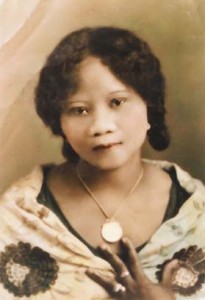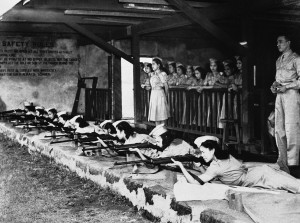Filipina Lives and Voices in Literature
That's the official title of the class I'm teaching at USF this semester. Preparing for and teaching the class continues to be a profound, even emotional process of recovery. As I tweak my syllabus for next semester, again, it makes me emotional. I told my students that no matter how much material I give them to read (and I apologized for over assigning reading), there is always so much more, and I fear that omitting anyone from my reading lists could potentially contribute to their invisibility.
One of the most obscure and challenging reads of the semester was The Crucible: An Autobiography of Colonel Yay, Filipina American Guerrilla. An unfamiliar voice, Colonel Yay Panlilio was a Colorado-born, mestiza Filipina who went to Manila as a journalist, and ended up a leader in the guerrilla movement against the Japanese in WWII. It seems a vital perspective for us Filipino/a Americans, this spirited and strong minded Filipino woman, willingly placing herself in harm's way, but as Denise Cruz, editor of the new version of the book has written, there are possible reasons why this book had fallen into obscurity, including its apparent pro-American stance. In the process of ethnic canon formation, we have to ask whose voices get pushed aside, for what reason, and at what expense. In this case, the Filipina contribution to the war effort has become invisible to Filipino Americans. The dominant paradigm for Filipinas in WWII is that of the victimized comfort woman, and not much more.
Perhaps I've mentioned poet and educator Jean Vengua's Commonwealth Cafe website here before, but if I haven't, then here's the link: http://www.commonwealthcafe.info. There are two op-ed pieces from the 1930's, on this website, that I teach. A very young San Francisco based, middle school aged Filipina American named Helen Rillera had written two impassioned first person essays about being in the minority as a young Filipina in a predominantly male Filipino American society (200 young men to 10 or 15 adolescent girls, Rillera wrote). Because Filipinas were here in apparently small numbers, they came of age, debuted to society quite young. Can you imagine being a girl considered eligible at such a young age, to have so many young men fighting over you, and to be expected to be accommodating and graceful as violence and jealousies erupt. Instead, young Rillera requests her Filipino brothers be accommodating themselves, not injurious, but supportive.
Panlilio's and Rillera's viewpoints are not viewpoints we are asked to consider, much less think of as existent, if we are ever taught early twentieth century Filipino American literature.
Here is Vengua's preface to Rillera's essays:
Helen Rillera was a student in John Sweet junior high school in San Francisco when she wrote this opinion piece for the Philippines Mail in Salinas. At the time, there was a great disproportion of Filipinos to Filipinas in the U.S. Filipinos were heavily engaged in labor organizing, and had encountered violent reactions from the white population. They were being called upon to sacrifice their time, energy, and possibly even their lives to the cause. Helen Rillera’s opinion is valuable because there are few writings by Filipinas available from this period, and very little had been published about their experiences in the U.S. during the 1930s. She wished to air "constructive criticism" while supporting the struggle of her Filipino comrades.

Another writer of note is Oakland native Evangeline Canonizado Buell, granddaughter of an African American Buffalo Soldier who fought in the Spanish American War and the subsequent Philippine American War. As an American brown man, he empathized with the Filipinos and their fight for independence and personhood. He eventually joined the Filipinos. Not only did I recently teach "Grandma as Rosie the Riveter," a chapter from Buell's book, Twenty Five Chickens and a Pig for a Bride, I also just read with her at the Oakland Asian Cultural Center. Hearing this story in her voice was amazing. The grandmother in Buell's story barely spoke English, and hence, felt limited in her social interactions and mobility. Being called a "Chink" and a "Jap," whenever she did venture out of the house did little for her confidence and courage. Working in the Richmond shipyards during WWII, gave her that confidence and self-worth in the world outside her door; inside the home, she learned how to negotiate and share domestic responsibilities with her husband.
And so while I know I am not talking about poetry here, I believe it's very important to mention that Filipino American women were writing and storytelling in this country in the early twentieth century. I believe it's even more important to note that there were very real barriers against their being able to write freely, much less get published. And indeed, whenever I bring this generation of women's words and stories to my students, they are struck by the invisibility of an entire generation. It's really an emotional experience, because many of them connect this invisibility to the undeserved lack of recognition many of their grandmothers experienced, for holding the families together, for working multiple jobs and still keeping the home, cooking, cleaning, childbearing.
In Alice Walker's essay, "In Search of Our Mothers' Gardens," she discusses the available or socially accepted creative outlets for African American women in the South in the 1920's. It was in that domestic space that women quilted, made and sewed their families' clothes, gardened, cooked. I asked my students to think about how this essay could possibly relate to our Filipina grandmothers, to these Manangs (elder Filipinas), and rather than perpetuating any ethnic stereotypes about grandmothers and cooking/food, I ask my students to think about what the consequences are for women who have not had access to literacy and education, or to the big worlds outside their homes.
In Jeannette Gandioco Lazam's poem, "What Happens When a Manang Dies," in the anthology Seven Card Stud With Seven Manangs Wild, the poet juxtaposes the public memorials and rowdy remembrances that our elder males, or Manongs, receive, as retired farmworkers and labor movement participants, and as military veterans, against the quiet deaths of the Manangs, for whom there are no such public remembrances, just a lot of invisibility.
Barbara Jane Reyes was born in Manila, the Philippines, and grew up in the San Francisco Bay area. She...
Read Full Biography


